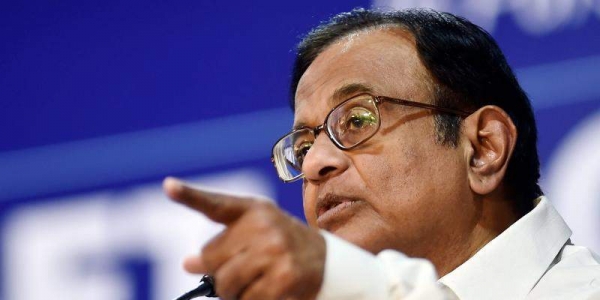Former Union Finance Minister P Chidambaram on Sunday claimed that the Congress-led UPA-1 and UPA-2 governments delivered the highest decadal growth since Independence.
The average growth rate under the UPA-1 government was 8.87 per cent, during which it also clocked double digit growth of 10.08 per cent in 2006-07, while under UPA-2 it was 7.39 per cent, he said, citing gross domestic product (GDP) data released by the statistics ministry.
The BJP promptly retorted claiming the UPA years were marked by rising inflation and current account deficits while the Modi government had turned the situation around. Addressing a press conference at the Congress office here, Chidambaram said, "UPA 1 and UPA 2 delivered the highest decadal growth of 8.13 per cent at factor cost since Independence. It is also a matter of record that during this period 140 million people were lifted out of poverty."
The back series data on GDP prepared by the Committee on Real Sector Statistics, constituted by the National Statistical Commission, was released on the website of the Ministry of Statistics and Programme Implementation (MOSPI) on Friday.
The report compares growth rates between the old series (2004-05) and the new series based on 2011-12 prices.
Asked if absence of a regular Finance Minister in the Modi government is responsible for the economic slowdown, Chidambaram said: "I thought there were three Finance Ministers -- one is de facto, one de jure, and one invisible."
On the falling rupee, the former finance minister said:"The investment is stagnant at 28.5 per cent. You cannot expect the GDP to grow more than 7 per cent.
"There is something known as Implemental Credited Output Ratio (ICOR). In India, we normally take four ICOR. You divide investment by Incremental Capital Output Ratio. It gives you an indication of the growth. If investment is 28.5 per cent and you divide it by four you will get a growth of only 7 or 7.1 per cent.
"Fiscal deficit is under pressure. The current account deficit in 2017-18 has already touched two per cent and I am told that in the current year, it will cross 2 per cent. All this is having an impact on the macroeconomic stability," he added.
On whether the Goods and Services Tax is flawed despite amendments, Chidambaram said that it proved that it was implemented in a wrong manner.
"I think, there are still grievances, there are still complaints. GSTR 2 and GSTR 3 have not been notified. Tax liability is being decided by temporary GSTR form called GSTR 3A. If you speak to business persons... they still face numerous difficulties in complying with GST laws," he added.
Chidambaram said that extraordinary powers have been given to various tax departments and humongous numbers of notices are sent out by every department.
"It only creates fear among the individuals as well as business persons," he said.
"Somebody who runs a medium-sized business gets a notice practically every third month... what is he supposed to do? Does the department have the capacity to deal with one lakh notices and two lakh notices? They don't have the capacity. Yet these notices are sent."
Chidambaram said that since this government had a majority in Parliament it should have repealed the so-called Vodafone amendment to the Income Tax Act.
"Far from that, they have sent Retrospective Tax demands to many other transactions. Vodafone did not turn out to be one-off case. There are several other cases where demands for tax retrospectively have been levied, which is frightening away investors.
"The way the GST is implemented is an example of tax terrorism... you ask someone to file 37 returns in a year in a single state. If he has all-India business, he has to file over 1,000 returns. What else is tax terrorism?" he asked.
(With agency inputs)

